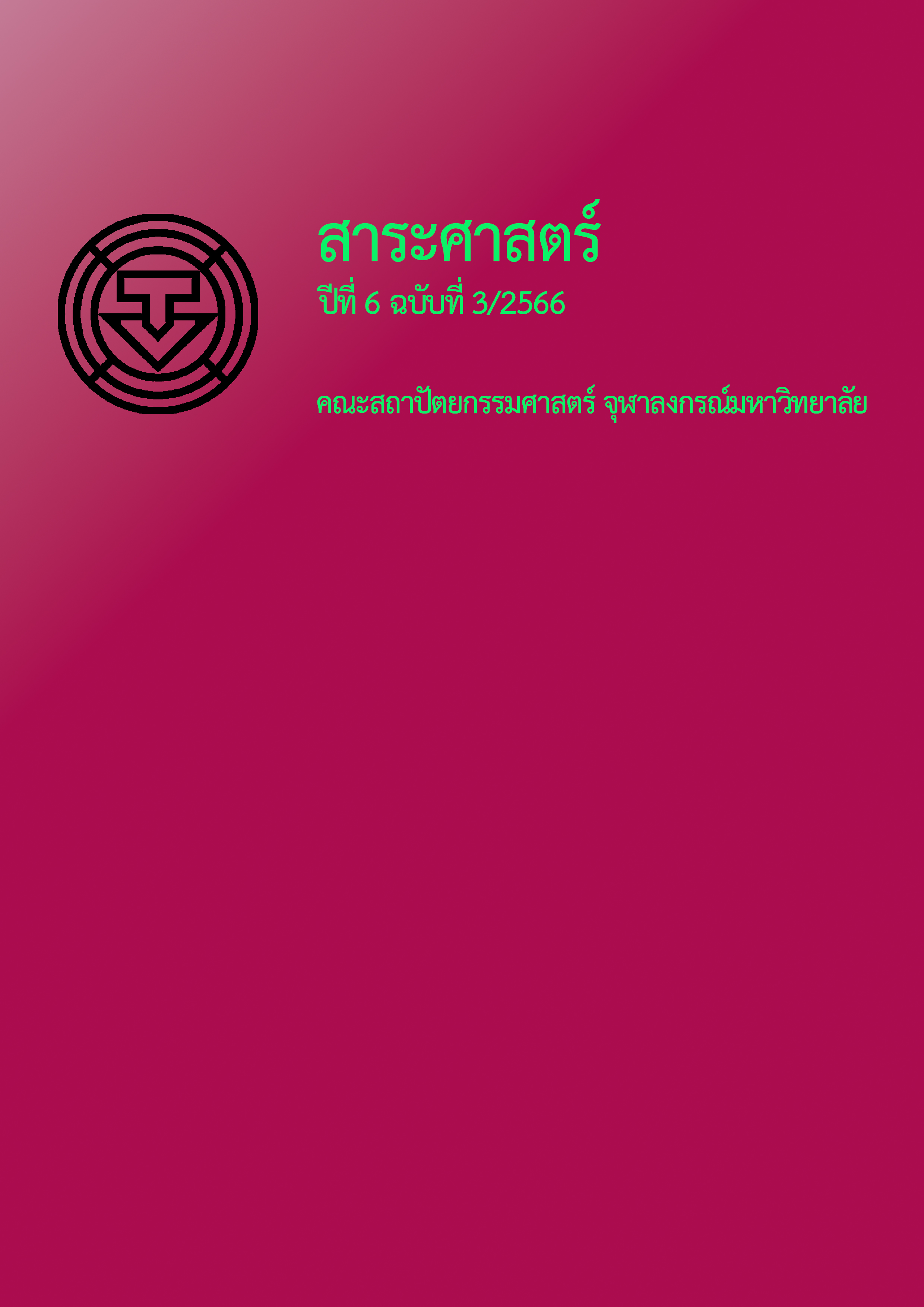Lessons Learned from the Low-Income Community Management Process during the COVID-19 Crisis: Case Study of Ban Krua Community, Ratchathewi District, Bangkok
Main Article Content
Abstract
During the COVID-19 epidemic situation in Thailand, slums were considered risky areas because people lived in crowded spaces. Even in developed slums, there were still problems with environmental management of the people in the community caused by the people in the community themselves lacking of hygiene, resulting in problems in the quality of life and health of the population. Ban Krua is a community that has distinctive features. It is a community with a long history and is the largest Muslim community in Bangkok. It is a community that has participated the CODI stable home process. The Ban Krua community is one of the communities that was hit hard by the COVID-19. However, the Ban Krua community had community management during the COVID-19 crisis. It was successful and had interesting points to take lessons from.
This article aims to study the characteristics of Ban Krua community before the spread of COVID-19 regarding physical environment, social nature, and the economy of household residents. It studies the impact on health when the COVID-19 epidemic occured. It studies community management processes to reduce impacts during the COVID-19 epidemic and analyzes lessons learned.
The Ban Krua community has been affected by the COVID-19 crisis. Regarding economy, there is a lack of income and increased expenditure on the purchase of disease prevention and cleaning equipments. The Ban Krua community has a management process, which is to improve the residence to allow for more ventilation. The Ban Krua community is a community that is representative of a self-organized community. The community has set up a community kitchen to distribute food and essential items. A group of volunteers was set up together with the Ban Krua Savings and Development Cooperative Group to help themselves in the community. There is coordination and receiving assistance and budget from government agencies and private organizations to manage the COVID-19 crisis.
This research sheds light on lessons learned about the process of managing low-income communities during the COVID-19 crisis. There are successful factors in various fields. Examples are that it is a community with a long history, and it is a community participating in CODI's stable house process, making it ready in terms of information. It is also a community with strong leaders. It receives cooperation from community members and the community can communicate their needs and open to cooperation from all sectors. People in the community are the main force in management. There are food management activities and physical management activities.
Article Details
References
กรุงเทพมหานคร. สำนักการวางผังและพัฒนาเมือง. กองนโยบายและแผนงาน. (2561). สถิติข้อมูลชุมชนในเขตกรุงเทพมหานคร. กอง.
กลุ่มออมทรัพย์ชุมชนบ้านครัว. (2564). แผนที่แสดงที่ตั้งและองค์ประกอบของชุมชนบ้านครัว เขตราชเทวี. กลุ่ม.
ทรงธรรม ชูเงิน. (2554). การศึกษากระบวนการและผลของการเสริมสร้างพลังในสามชุมชนนำร่องของโครงการบ้านมั่นคง กรุงเทพมหานคร [วิทยานิพนธ์ปริญญามหาบัณฑิต ไม่ได้ตีพิมพ์]. จุฬาลงกรณ์มหาวิทยาลัย.
Thai PBS. (2565). สถิติผู้ติดเชื้อโควิด-19 ในไทย. ไทยสู้โควิด-19. https://covid19.thaipbs.or.th
นงลักษณ์ จิ๋วจู, ทิพย์วรรณ ศิบุญนันท์, อนุ ธัยชะพงษ์, ชญาน์นันท์ ศิริกิจเสถียร, ชูเกียรติ เนื้อไม้, และประพัสสร บัวเผื่อน. (2558). การถอดบทเรียนความสำเร็จการเป็นชุมชนต้นแบบด้านเศรษฐกิจพอเพียงเพื่อนำมาพัฒนาชุมชน บ้านวังน้ำแดง หมู่ที่ 5 ตำบลท่ามะเขือ อำเภอคลองขลุง จังหวัดกำแพงเพชร. การประชุมวิชาการระดับชาติ ครั้งที่ 2 สถาบันวิจัยและพัฒนา มหาวิทยาลัยราชภัฏกำแพงเพชร (หน้า 210-227). กำแพงเพชร: มหาวิทยาลัย.
นิลุบล สู่พานิช. (2550). แนวคิดการจัดการภัยพิบัติ. กรมป้องกันและบรรเทาสาธารณภัย กระทรวงมหาดไทย.
ไพโรจน์ ภัทรนรากุล. (2550, พฤษภาคม-สิงหาคม). การจัดการภาครัฐกับการเสริมพลังประชาชน. วารสารรัฐประศาสนศาสตร์, 5(1), 87-122.
ภศิกา ผลารักษ์. (2550). การจัดการความรู้เพื่อฟื้นฟูชุมชนและรับมือกับภัยพิบัติ : กรณีศึกษาบ้านน้ำเค็มจังหวัดพังงา [วิทยานิพนธ์ปริญญามหาบัณฑิต ไม่ได้ตีพิมพ์]. จุฬาลงกรณ์มหาวิทยาลัย.
วิทวัส วิมลเสตถ์. (2563). แนวทางการปรับปรุงที่อยู่อาศัยและพื้นที่ภายนอกอาคารสำหรับผู้สูงอายุในชุมชนมุสลิมในพื้นที่กรุงเทพฯชั้นใน กรณีศึกษา : ชุมชนบ้านครัว [วิทยานิพนธ์ปริญญามหาบัณฑิต ไม่ได้ตีพิมพ์]. จุฬาลงกรณ์มหาวิทยาลัย.
ศิรินันต์ สุวรรณโมลี. (2552). การศึกษาแนวทางการพัฒนาการจัดการความเสี่ยงจากภัยพิบัติโดยชุมชนเป็นฐานจากภาคประชาสังคม : กรณีศึกษาชุมชนบ้านน้ำเค็ม ตำบลบางม่วง อำเภอตะกั่วป่า จังหวัดพังงา [วิทยานิพนธ์ปริญญามหาบัณฑิต ไม่ได้ตีพิมพ์]. มหาวิทยาลัยเทคโนโลยีพระจอมเกล้าธนบุรี.
สภาร์ รอดเรื่อง. (2544). การจัดการชุมชนที่อยู่อาศัยในที่ดินของวัดช่องนนทรี [วิทยานิพนธ์ปริญญามหาบัณฑิต ไม่ได้ตีพิมพ์]. จุฬาลงกรณ์มหาวิทยาลัย.
สุภาวดี เพชรชนะ. (2558). กระบวนการจัดการตนเองของชุมชนบ้านมั่นคงสวนพลู เขตสาทรกรุงเทพมหานคร [วิทยานิพนธ์ปริญญามหาบัณฑิต ไม่ได้ตีพิมพ์]. มหาวิทยาลัยธรรมศาสตร์.
Castro-Sanchez, E., Vila-Candel, R., Escobedo, A. A., Chang, Peter WS. (2016). Health literacy and infectious diseases: Why does it matter?International Journal of Infectious Diseases, 43, 103-110.
Sun, X., Shi, Y., Zeng, Q., Wang, Y., Du, W., Wei, N., Xie, R., & Chang, C. (2013). Determinant of health literacy and health behavior regarding infectious respiratory diseases: A pathway model. BMC Public Health, 13(1), 261.


